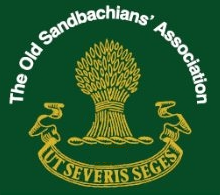
In my Leeds attic is a black metal trunk, full of old letters from the 1980s. Between 1981 and 1984, I was in regular correspondence with John Bowles (1921–2003), who had then just retired as Headmaster of Sandbach School. Funnily enough, I had not known him very well at Sandbach. John, as he asked me to call him, was delighted when I decided to spend a year out (in the days before ‘gap year’ became the preferred term) working in a London Borough of Camden assessment centre for troubled teenagers as a Community Service Volunteer (CSV) – and he wanted to hear all about it.
We kept on writing to one another after I finished my volunteer stint and started a degree in English at Royal Holloway, University of London. The six letters I still have from him, written on an old manual typewriter, are all at least two pages long, mixing news, pep talks, and musings on the meanings of life, the world and politics. A couple of them even include little pencil sketches of scenes from his hiking trips.
In one letter, John explained that he felt conflicted: was he a Quaker, or an evangelical? His Quakerism was evident in his very genuine concern for humanitarian causes – John’s internationalism, environmentalism and passion for social justice were well ahead of his time. I must admit I struggled, though, with the evangelical side of his character. Personifying a kind of muscular Christianity that made me uneasy, John saw the world in black-and-white terms, as a kind of cosmic struggle between good and evil. Most of his letters included unsolicited references to God and prayer (which I ignored), while a couple even contained leaflets from the Sandbach Methodist Church on Wesley Avenue.
Back then, I was deeply in love with English, fascinated by images, wordplay, metaphors and multiple types of ambiguity – fluffy notions with which he had little affinity. In one letter he wrote:
You may even be frustrated by the unreality of literature – not unreality so much as distance from involvement in real solutions to real problems. I know someone who left literature for History or Economics to get into hard facts – some hope!
Not for John, apparently, the lure of dreams and imagination: his was a world of practicalities and of social problems to be confronted.
All of us knew Mr. Bowles primarily through his legendary assemblies: I must have listened to hundreds of his morning talks during my seven years at Sandbach School, many of them berating the mass of huddled boys to shun the twin evils of alcohol and tobacco. I vividly remember the culmination of a series of assembly talks on one his favourite topics, ‘Great rebels of history’, including figures such as Jesus Christ, Dietrich Bonhoeffer and Mahatma Gandhi. Wrapping up, he proclaimed: ‘Boys, I want you to go forth from this hall and rebel. But not at school.’
In his letters to me, John described struggling with his own authority throughout his years as a headmaster. He confessed that he wore a red tie every working day to symbolize his inner rebellion as a Christian socialist, although never a member of any political party. John’s letters were full of critical commentary about the politics of the day: he was very unhappy about, for example, Margaret Thatcher’s government, cuts in public spending, and indeed the Falklands War, which coincided with my CSV year.
In one letter, John recounted how during his time as a naval petty officer in charge of a hospital ward during the war, he had silently renounced naval authority and never gave an order, instead simply asking his subordinates to do things. He told me he had been commended for maintaining excellent discipline in his unit: his superiors never noticed that he achieved this discipline through rather unconventional means. John Bowles was rather an unusual headmaster for his times: he sought to influence and inspire those around him, especially the boys, rather than exercising power and authority over them.
My work at the assessment centre was very demanding, to put it politely – I was only a year or two older than some of my challenging charges – and at various points I was on the verge of quitting. To my surprise, John didn’t urge me to plough on regardless, and at one point suggested that nobody would think any the worse of me if I ended my stint as a CSV early. He invited me over to his house in Brereton when I was back in Cheshire – an invitation I took up – and even offered to come down and meet me in London (that trip never took place). He was always encouraging and relentlessly upbeat, but never judgmental: all that mattered was that I did my best. In that sense, he was the perfect supportive correspondent for a struggling youngster.
John Bowles became Headmaster in 1964. A first-class honours History graduate from University College London, he had already been Head at Southfield School in Oxford (then a secondary modern, now incorporated into Oxford Spires Academy). Unusually for a schoolteacher, John had also published a book with University of London Press in 1956, entitled Dramatic Readings in History: England A.D. 597-1745. Experienced and academically distinguished, he was an inspired appointment, extremely dedicated to raising standards at Sandbach School across the board.
Another sub-text of his letters concerned his tensions with the School governors. John had wanted to change the motto Ut Severis Seges – which he considered fatalistic – ideally by replacing it with the single word ‘Service’. On this and other matters, he clashed with the long-serving chair of governors, local solicitor Cecil Rigby. I remember another school assembly during which he announced that the governors wanted to repaint a lot of the classrooms and public areas – but made it clear that he opposed the plan as a waste of money. ‘I have informed the governors that my own study will not need painting for at least ten years’, he declared.
Here I must admit I was in complete agreement with the governors – by the mid-1970s the magnificent Scott buildings were looking distinctly shabby, and the installation of John’s successor Bryan Hooton in 1980 was immediately followed by some much-needed beautification of the Victorian facades. Though certainly well-intentioned, John’s signature frugality – he delighted in writing to me almost entirely on recycled stationery, his envelopes usually bearing large stickers from ActionAid, a charity sponsoring children in what was then called the Third World – at times crossed over into sheer parsimony.
John Bowles played a key role in negotiating the all-important 1976 agreement with Cheshire County Council, under which Sandbach became a boys’ comprehensive school, thereby, as he put it ‘helping to end selection and making a more Christian system at least possible’. But at some point John seems to have fallen out irrevocably with the governing body. In 1979, the governors appointed Bryan Hooton to the transitional role of Headmaster Designate, until 1981 – but this two-headed model didn’t work. By the summer of 1980 John had stepped down, officially to take a sabbatical year.
After working incredibly hard to lead Sandbach School to ever-greater heights for sixteen years, John Bowles was effectively eased out of his headship before the age of 60. Many people in a similar position would have been left bitter, if not furious. But thanks to his natural optimism and the certainty he derived from his religious faith, John was remarkably undaunted, instead throwing himself into volunteer projects with Action Aid, Gingerbread, and other charities. ‘What retirement?! Tons to do.’ he wrote. In another letter, he did quip that after he left Sandbach, at least a couple of boys had declared: ‘Come back J.H.B., all is forgiven’.
John Bowles was undoubtedly a great headmaster, presiding over a wonderful period in Sandbach School’s history that included the tercentenary in 1977. John’s thoughtful concern for a very young Old Boy in those 1980s letters testifies to the generous and kindly spirit of a very decent man, one whose heart was always in the right place.
Duncan McCargo was at Sandbach School from 1974 to 1981


